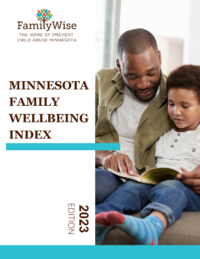Our 2023 Family Wellbeing Index
Parenting is hard, even in the best of circumstances. All families need the support of their communities in order to thrive, from affordable and accessible housing opportunities to friends and neighbors that can help parents by babysitting, offering words of encouragement, or shoveling snow.
Our first Family Wellbeing Index, published last year, showed that there is ample data about barriers to family stability, like inaccessible health insurance and childcare resources. This year we further explore data around concrete (formal) supports for families, including paid family leave and mental health services. In the wake of the pandemic, these supports are more important than ever, and present an opportunity to improve the wellbeing of families.
Last year, the way we presented the data showed inequities in our state between White and Black, Indigenous and People of Color (BIPOC) families. This year we provide a fuller picture, disaggregating data by race to show that access to fundamental sources of family wellbeing are disproportionately out of reach for American Indian and Black households due to past and present systemic racism. Every child should have the support they need to thrive. To achieve this, we need to address the social problems, unfair practices, and unjust conditions that stem from systemic racism. These impacts of racism undermine the healthy development of children and families.
At FamilyWise, core to our approach is the belief that natural (informal) supports, such as family, friends and neighbors, are what sustains the stability and wellbeing of families. Last year our Family Wellbeing Index illustrated that it is hard to find statewide data about factors that lead to safe and strong families. In this year’s report, we share our own efforts to better understand the barriers and levers for effectively building families’ natural support networks.
This report is being published in April in recognition of Child Abuse Prevention Month, with the hope of contributing to the conversation about how all of us, both personally and professionally, can support the wellbeing of Minnesota children and families.
